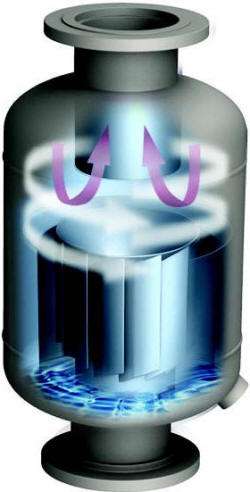Vertical Gas Liquid Centrifugal Separators
Moisture separators for vent pipes
L Style Gas Liquid Separator

| Type: | Vertical, single stage |
| Maximum entrained liquid removal: | 10% of the maximum weight flow capacity |
| Will it handle "slugs" of liquid: | No |
| Maintenance required: | None |
Type L vertical gas liquid separators are used when the flow path
involves traveling vertically upwards (for a downwards flow path refer
to the horizontal type L). Our vertical
centrifugal separators will remove entrained droplets
and particles larger than 10 microns with 99% efficiency. The most
common and inexpensive vertical gas liquid separator consists of a
cylindrical pressure vessel having an inlet and outlet 180° apart
(in-line) in addition to a drain port. The centrifugal baffle
assembly is located at the inlet side of the separator.
As illustrated, the air, steam or gas enters the separator and flows around a
slotted baffle which induces a vortex, exerting centrifugal force on
entrained droplets and particles.
Larger droplets are propelled and imping into the baffle or vessel walls and due to gravity, coalesce to the low point of
the vessel for drainage. Only droplets finer than 10 microns enter the
low velocity section of the vortex where the exit pipe is located.
Automatic drainage without any loss of
air, steam or gas can be accomplished with a
float style
drain trap.
The liquid removal capacity for the unit
illustrated is equivalent to 10% of the
separators maximum weight-flow capacity. The removal
capacity doubles to 20% for designs having inlet and outlet nozzles
tangential to each other due to the increased complexity of the
torturous path the process gas must pass through to exit the gas liquid
separator.
Another type of vertical separator is an
exhaust head, which are not pressure vessels because they are
installed at the end of a vent pipe to atmospheric pressure.
Exhaust heads reduce the opacity of the vented gas, reducing carry-out
and enabling reclamation of treated fluid.



